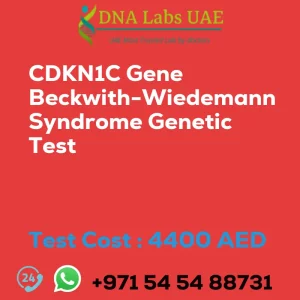PTCH1 Gene Basal Cell Nevus Syndrome Genetic Test
Welcome to DNA Labs UAE, a leading genetic lab offering a wide range of genetic tests. In this blog, we will discuss the PTCH1 Gene Basal Cell Nevus Syndrome Genetic Test, including its components, cost, symptoms, diagnosis, and more.
Test Name: PTCH1 Gene Basal Cell Nevus Syndrome Genetic Test
Components:
- Price: 4400.0 AED
- Sample Condition: Blood or Extracted DNA or One drop Blood on FTA Card
- Report Delivery: 3 to 4 Weeks
- Method: NGS Technology
- Test Type: Cancer
- Doctor: Oncologist
- Test Department: Genetics
Pre Test Information:
Before undergoing the PTCH1 Gene Basal Cell Nevus Syndrome Genetic Test, it is important to provide the clinical history of the patient. Additionally, a genetic counseling session will be conducted to draw a pedigree chart of family members affected by the PTCH1 Gene Basal Cell Nevus Syndrome NGS Genetic DNA Test gene PTCH1.
Test Details:
The PTCH1 gene is responsible for encoding a protein called Patched-1, which plays a role in the Hedgehog signaling pathway. Mutations in the PTCH1 gene can result in a rare genetic disorder known as basal cell nevus syndrome, or Gorlin syndrome. This condition is characterized by the development of multiple basal cell carcinomas, a type of skin cancer. Individuals with basal cell nevus syndrome may also exhibit jaw cysts, skeletal abnormalities, and palmar or plantar pits.
To analyze the PTCH1 gene for mutations, we utilize next-generation sequencing (NGS) technology. NGS allows for the simultaneous analysis of multiple genes or even the entire genome, making it a powerful tool in identifying genetic variations associated with diseases. By performing an NGS test on the PTCH1 gene, our healthcare professionals can identify specific mutations that may be responsible for basal cell nevus syndrome. This information is crucial for accurate diagnosis, genetic counseling, and effective management of the condition.
At DNA Labs UAE, we are committed to providing reliable and accurate genetic testing services. Our PTCH1 Gene Basal Cell Nevus Syndrome Genetic Test is conducted by experienced oncologists in our Genetics department. With a turnaround time of 3 to 4 weeks, we ensure timely delivery of comprehensive reports.
If you suspect basal cell nevus syndrome or have a family history of the condition, we recommend considering the PTCH1 Gene Basal Cell Nevus Syndrome Genetic Test. Early detection and intervention can significantly impact the management and prognosis of this genetic disorder.
For more information or to schedule an appointment, please contact DNA Labs UAE today.
| Test Name | PTCH1 Gene Basal cell nevus syndrome Genetic Test |
|---|---|
| Components | |
| Price | 4400.0 AED |
| Sample Condition | Blood or Extracted DNA or One drop Blood on FTA Card |
| Report Delivery | 3 to 4 Weeks |
| Method | NGS Technology |
| Test type | Cancer |
| Doctor | Oncologist |
| Test Department: | Genetics |
| Pre Test Information | Clinical History of Patient who is going for PTCH1 Gene Basal cell nevus syndrome NGS Genetic DNA Test. A Genetic Counselling session to draw a pedigree chart of family members affected with PTCH1 Gene Basal cell nevus syndrome NGS Genetic DNA Test gene PTCH1 |
| Test Details |
The PTCH1 gene is a gene that encodes a protein called Patched-1, which is involved in the Hedgehog signaling pathway. Mutations in the PTCH1 gene can lead to a condition called basal cell nevus syndrome, also known as Gorlin syndrome. Basal cell nevus syndrome is a rare genetic disorder characterized by the development of multiple basal cell carcinomas, a type of skin cancer. Individuals with this syndrome also have other physical features, such as jaw cysts, skeletal abnormalities, and palmar or plantar pits. Next-generation sequencing (NGS) is a genetic test that can be used to analyze the PTCH1 gene for mutations. NGS allows for the simultaneous analysis of multiple genes or even the entire genome, making it a powerful tool for identifying genetic variations associated with diseases. By performing an NGS test on the PTCH1 gene, healthcare professionals can identify specific mutations that may be responsible for basal cell nevus syndrome. This information can help with diagnosis, genetic counseling, and management of the condition. |








